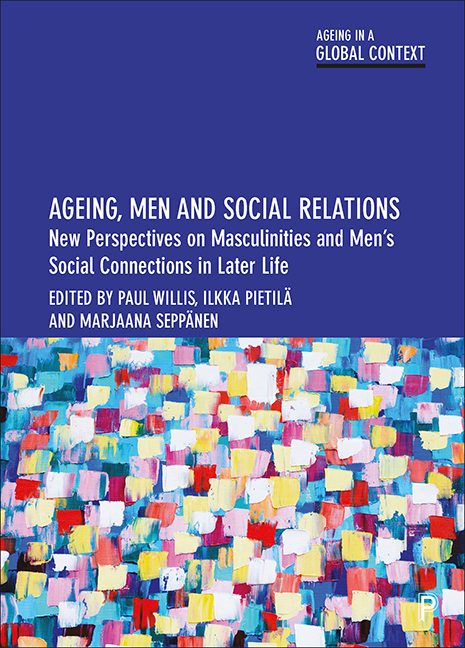 Ageing, Men and Social Relations
Ageing, Men and Social Relations Book contents
11 - Shaken identities: ageing men’s experiences of two gendered cancers
Published online by Cambridge University Press: 18 January 2024
Summary
Introduction
Sizeable bodies of qualitative research now report on men’s post-surgical experiences of two cancers – breast cancer in men (BCiM) and prostate cancer (PCa). This chapter targets how cisgender men’s social and bodily ageing may mediate their post-mastectomy narratives compared to the narratives of men post-prostatectomy. Notably, BCiM and PCa are the experiences of ageing men. The median age for men’s breast cancer (BC) diagnosis is about 68 (Konduri et al, 2020); similarly, the median age of a PCa diagnosis is late onset, commonly in men’s mid-to-late 60s (Droz et al, 2010). Few studies have called attention to the place of corporeal and social ageing as an inseparable dimension of men’s cancer journey. As well, we are unaware of any comparative analysis of the experiences of men with BC and men with PCa after their surgical treatment. The diagnosis and treatment of BCiM and PCa are known to fundamentally shake men’s identities as men, drawing into question their embodied masculine self (for example, France et al, 2000; Gray et al, 2002b). By drawing on the available qualitative research literature, we summarise how ageing men wrestle with and talk about the interwoven experiences of getting older and having a gendered cancer.
Cancer, ageing and masculinities
Comparing men’s post-surgical experiences with prostate cancer and breast cancer is particularly salient because they are oppositely gendered cancers in the public imagination. One is the most known and second deadliest cancer among men. Data for the US and the UK estimate that one in eight men in will develop and live with prostate cancer in his lifetime (American Cancer Society, 2021; Cancer Research UK, 2021).
Unlike prostate cancer being a sex-specific disease, breast cancer is not exclusively a malignancy of one sex. Men too have breasts though very rarely breast cancer. BCiM barely accounts for 1 per cent of newly diagnosed BC cases worldwide and represents less than 1 per cent of new cancers diagnosed in men, slightly more than testicular or penile cancer (World Health Organization, 2021).
- Type
- Chapter
- Information
- Ageing, Men and Social RelationsNew Perspectives on Masculinities and Men's Social Connections in Later Life, pp. 169 - 187Publisher: Bristol University PressPrint publication year: 2023
